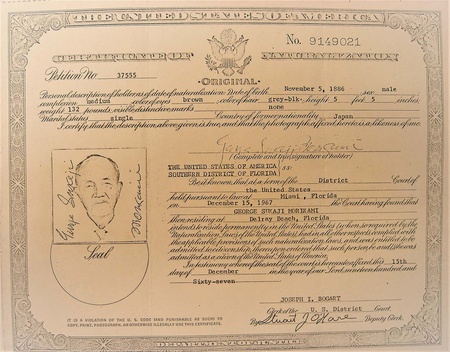Morikami Sukeji came to America as a member of the Yamato Colony in South Florida, and remained there alone until the end of his life after the colony was disbanded. After the war, he continued to write letters to his sister-in-law and her family, whose husband (Sukeji's younger brother) had died. At the end of 1967, Sukeji gained American citizenship. He had been considering whether to return to Japan, but at this point he was overjoyed that his long-cherished wish had come true, and he spoke earnestly about how he owed it all to America that he had been able to live up to that point. In recognition of his many years of achievements, he was awarded the title of honorary citizen by his hometown of Delray Beach.
* * * * *
61 years ago, a hotbed of heat and mosquitoes
May 15, 1967
Thank you for your letter, Mi-san (sister-in-law). Nothing has changed here. I spend my days sleeping, eating, getting angry, and yelling. Maybe it's because of my age, but I've become short-tempered and get angry over trivial things. Today is May 15th, 61 years ago, when I arrived here. It was a cold village with a population of less than 200, a den of scorching heat and mosquitoes.
My plan to stay for three years turned into a lifetime of ups and downs. There is nothing more mysterious than a person's fate. Today, I happened to meet a fellow countryman through an acquaintance. He is from Fukui Prefecture and has been in the US for 40 years. He is a very eloquent speaker who has graduated from two or three universities. He is currently working for the government. It is already the height of summer here, with temperatures reaching 80 to 90 degrees (around 30 degrees Celsius). The winter visitors from the north are gradually leaving, and it has become quite quiet.
(I ordered the seeds from Kyoto.)
Last summer there was a rare drought, with not a single drop of rain for over two months, and the crops were in danger of being completely destroyed. Seeds were ordered from Takii in Kyoto, but they did not grow well; only black pine and vegetables grew satisfactorily, and neither nandina (with both red and yellow leaves), maple (with autumn leaves), nor Japanese plum blossoms grew at all.
According to the local agricultural experiment station, it was because of dead old seeds. I planted the cherry blossom, Tanba chestnut, and maple seedlings I made in this country a year ago, and all the Yoshino cherry blossoms withered, but the peony cherry blossoms grew well and are currently in bloom. I notified Takii about this, but there was no reply.
April 6, 1967
Aki-chan (niece), your life is as cheerful as ever, there is nothing better. I believe your dreams will come true. Enjoy the wait. I haven't been feeling well lately. The other night I had a sudden hernia and had to call a doctor. I've never suffered so much before. But there's no need to worry, fortunately I have kind and dear friends in the neighborhood. They are closer neighbors than distant relatives.
The weather is perfect. People from the north are starting to return home in droves. It's quiet now. Pineapples, raspberries, peaches, and other fruits are ripening in the fields. They taste the best, and are incomparable to those you can buy in a store. I wish Aki-chan was here. Japan's development is the envy of the world.
My cat gave birth to five kittens. They all have different fur colors. Their eyes opened, they started crawling around, and they got fat. I love cats, and I've had 11 of them.
Meeting a Japanese woman for the first time in a long time
June 9, 1967
Thank you for your letter, Mi-san. It has been raining here for the past two weeks and the fields are covered in grass. I am still not feeling well and am taking a rest.
The other day, I met a Japanese woman for the first time in a long time. I was born in Hawaii, but I received the best education in Japan, so I was able to speak to her in Japanese for the first time in a long time. I understand why you are worried about Akiko's marriage. Akiko is 25 years old, and modern women do as they please. An unwilling marriage or a forced marriage is a graveyard of misery for the rest of their lives. There is no need to worry about what others think. Take care of yourself during this scorching heat. Goodbye.
(I read Ichiro Tsuneoka's "Unlocking Your Destiny" and felt a great sense of accomplishment.)
October 16, 1967
Dear Mi-san, Thank you for your letter after a long time. I hope everyone is well. I am doing well and busy with farm work. I moved to the farm about a month ago and my mailing address has changed as shown on the left.
I was deeply moved by the book "Unmei wo Hiraku" by Ichiro Tsuneoka (note 1) that you sent me last year, so I would like to read all of his other books. I have contacted the publisher and inquired about the price, including shipping, but have not received a reply yet. I apologize for the inconvenience, but I would like to know the price, including shipping, of the book listed above, and I will send the money right away.
Footprints of ... pointing to the center
Transience, Temperament and Heart
Searching for a path, a letter from heaven
Dotamba Story: 5,000 Days of Fighting Illness
Reflection...Beyond
Religion for Living: True Faith
Monthly publication
(Note 1) Ichiro Tsuneoka was born in Fukuoka Prefecture. He founded the training group "Chuushinsha" and ran for and was elected to the House of Councillors (Ryokufu-kai). He later contributed to improving the status of Tenrikyo.
Will he finally become an American citizen?
November 14, 1967
Akiko-chan, thank you for your letter after such a long time. I haven't been feeling well lately, so I haven't felt like writing you a letter, and that's why my reply is late. I'm glad you're as cheerful as ever. Most of the letters from home are full of whining and envy, so I don't feel like reading them.
Recently, it has suddenly gotten cold in Florida, and I feel cold at night. I moved to the fields about two months ago, and it is quiet and nice. There are five cats in the house, so I don't feel lonely. A few days ago, an old comrade passed away. He was a man from Tajima who came to America at about the same time as me, and he has a wife, three sons, and one daughter. They were a very hardworking family and made quite a fortune. There is only one other comrade left besides me. He is prone to a certain illness and will not last much longer.
The 5th was my birthday, and one of my friends threw a party to celebrate with me. I think it's best to forget about age in order to live a long life.
I have finally become a naturalized American. This will make it easier to bring me here. Life is all about attitude, whether you live your whole life crying or laughing. Money alone will not make you happy.
December 6, 1967
I received six books the other day. There are no stamps on them, so I don't have enough postage. They weigh just two kilograms, so the postage would be very little if sent by regular parcel mail, but it would be several times more expensive if sent by airmail. Please be careful in the future. I will send the payment as soon as I receive the bill. Akiko is a good girl. She is cheerful and has inherited the temperament of her father, Yoneji.
Japan seems to have changed. This country has changed too. It's a world apart from ten years ago. Salaries have gone up, but prices have also risen, making life harder and harder. If we're not careful, it could be irreversible.
Receive the honorary citizenship award
January 4, 1968
Aki-chan, I received your package the other day. It was the best gift for me, who gets cold easily, so I was grateful to receive it. It's also quite cold here at night. I often sleep wrapped in an electric blanket. My health is still the same, and all my joints hurt. Right now, my left elbow hurts and I can't hold anything.
The heel of my left foot hurts and I can't walk well. The fingers on my right hand hurt too, and sometimes I can't even write. There is a labor shortage, and I'm so busy with work that I end up pushing myself too hard. I don't have many days off. I planted watermelon seeds. If there are no injuries, I'll be able to eat watermelon around mid-March. The crops are growing lushly, and when I go out to the field, I forget everything else.
Last December 15th was the biggest anniversary of my life. I had fulfilled a long-cherished wish of about 60 years, and became a naturalized American citizen. The newspapers reported the news extensively, including photos, and celebrated the occasion. All my acquaintances and friends were also happy for me.
(I contacted Japan as well, but) no one immediately congratulated me. Not only that, but they just kept asking me to send them money. I was disappointed. Even though we live in an age where money is all-powerful, is this really okay? I don't lack for anything. I owe my current situation to this country. If I had gone to another country, it wouldn't have been like this.
For a long time after the war, we probably couldn't even support you. We probably couldn't even educate you and Reiko. We owe what we are today directly and indirectly to this country. I say this, but I haven't done anything for this country. I don't have much time left. I have to do something.
Last fall, there was a city council meeting. I was invited. I was awarded the honorary citizenship without having done anything. I received a round of applause from nearly 100 city residents. I was completely surprised and didn't know what to say to thank them.
Now that the New Year's commotion has died down and we are enjoying a peaceful New Year, I decided to write down my thoughts without reservation, and to express my thanks for the gifts I received.
(Titles omitted)
© 2020 Ryusuke Kawai







